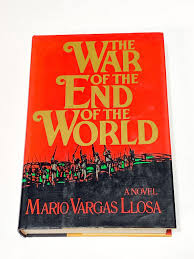Chaos, Faith, and Rebellion: Exploring “The War of the End of the World” by Vargas Llosa
It is not a new relase but a 1981 published story, that I dug up from a box in my attic and now am rereading. I'm loving it so much, I wanted to share this treasure: Mario Vargas Llosa’s epic novel The War of the End of the World is a sprawling, deeply philosophical, and emotionally charged historical narrative set in the arid hinterlands of 19th-century Brazil. Blending fiction with fact, Vargas Llosa dives headlong into the violence, fanaticism, and political turmoil that marked one of Latin America’s most fascinating—and tragic—rebellions. This book is more than a historical novel; it is an examination of power, ideology, and human resilience.
A Vision of Rebellion: Plot Overview (No Spoilers)
The War of the End of the World recounts events inspired by the real-life War of Canudos, a conflict that erupted in the Brazilian northeast in the 1890s. The story centers around a messianic figure known only as "the Counselor," who inspires a large community of impoverished peasants, ex-slaves, and outcasts to create a utopian settlement in the arid backlands. This settlement—Canudos—rejects the authority of the newly formed Brazilian Republic, choosing instead to follow the religious and social teachings of their prophet-like leader.
As the settlement grows, it draws the ire of the government, which views it as a threat to national stability and republican values. A violent confrontation becomes inevitable, and the novel traces this inexorable march toward war through a wide array of perspectives: monarchists, fanatics, soldiers, journalists, and ordinary people caught in the conflict.
What makes the narrative gripping is Vargas Llosa’s ability to shift voices and viewpoints, providing a mosaic of ideological clashes—from blind faith to radical rationalism. The novel isn’t just about a war; it’s about the collision of worldviews in a time of seismic political and spiritual change.
Why This Book Matters
Reading The War of the End of the World is a demanding but richly rewarding experience. Vargas Llosa’s prose is powerful, evocative, and deeply human. His depiction of the Brazilian backlands is almost mythic in scale—dusty, violent, and alive with conviction. The characters, especially the Counselor and his followers, are portrayed with a rare depth that avoids caricature. Even as they veer into extremism or madness, their motivations remain painfully comprehensible.
What I found particularly impressive is how the novel doesn’t moralize. Instead, it presents a panorama of ideas and lets the reader grapple with them. It interrogates the role of ideology—both secular and religious—and explores how it can empower or destroy. The book also touches on timeless issues like poverty, political manipulation, and the dangers of dehumanizing one’s enemies.
This is a novel for readers who appreciate complexity and who are willing to engage with moral ambiguity. It’s not fast-paced, but it builds with an epic gravity that makes the final chapters unforgettable. If you enjoy novels like Les Misérables, Blood Meridian, or One Hundred Years of Solitude, then Vargas Llosa’s masterpiece will likely resonate with you.
About The Author: Mario Vargas Llosa and His Literary Legacy
Mario Vargas Llosa is one of Latin America's most important literary voices. Born in Peru in 1936, he is a Nobel Laureate in Literature (2010) and part of the Latin American literary boom alongside writers like Gabriel García Márquez, Julio Cortázar, and Carlos Fuentes. Unlike some of his contemporaries, Vargas Llosa's style leans toward realism rather than magical realism, with a strong focus on political and historical themes.
Besides The War of the End of the World, some of his other notable works include:
-
The Time of the Hero – A semi-autobiographical novel about life in a Peruvian military academy, which launched his career.
-
Conversation in the Cathedral – A dense, powerful exploration of authoritarianism in Peru.
-
Aunt Julia and the Scriptwriter – A lighter, semi-comic novel based on his own early life and romantic entanglements.
-
The Feast of the Goat – A chilling look at the dictatorship of Rafael Trujillo in the Dominican Republic.
Each of his novels combines meticulous research with a novelist’s empathy and imagination. Vargas Llosa is not afraid to tackle uncomfortable truths, and his work often challenges political and social norms.
Final Thoughts: Why You Should Read It
The War of the End of the World is more than a historical novel—it’s a profound reflection on human conviction and the price of belief. In a world where ideological conflict is once again rising, this book offers a sobering reminder of what happens when dialogue breaks down and dogma takes over. It’s not an easy read, but it is an essential one. For anyone interested in the intersection of literature, politics, and history, Vargas Llosa’s masterpiece remains one of the most significant novels of the 20th century.




Comments
Post a Comment